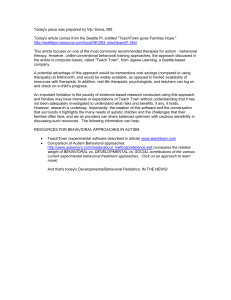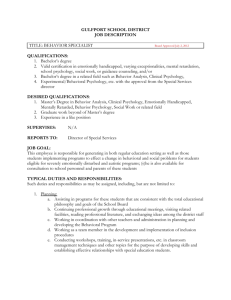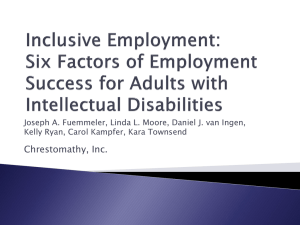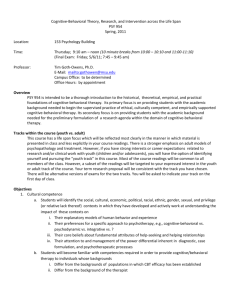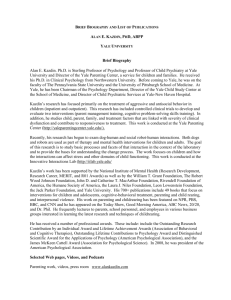Class Presentations
advertisement
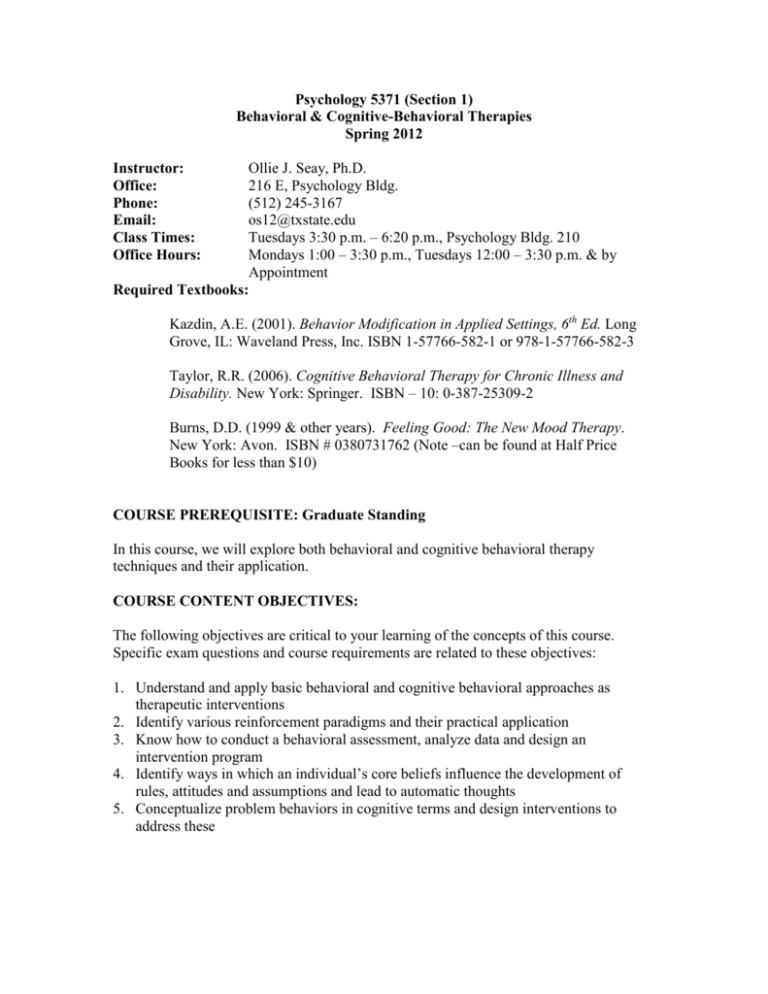
Psychology 5371 (Section 1) Behavioral & Cognitive-Behavioral Therapies Spring 2012 Instructor: Office: Phone: Email: Class Times: Office Hours: Ollie J. Seay, Ph.D. 216 E, Psychology Bldg. (512) 245-3167 os12@txstate.edu Tuesdays 3:30 p.m. – 6:20 p.m., Psychology Bldg. 210 Mondays 1:00 – 3:30 p.m., Tuesdays 12:00 – 3:30 p.m. & by Appointment Required Textbooks: Kazdin, A.E. (2001). Behavior Modification in Applied Settings, 6th Ed. Long Grove, IL: Waveland Press, Inc. ISBN 1-57766-582-1 or 978-1-57766-582-3 Taylor, R.R. (2006). Cognitive Behavioral Therapy for Chronic Illness and Disability. New York: Springer. ISBN – 10: 0-387-25309-2 Burns, D.D. (1999 & other years). Feeling Good: The New Mood Therapy. New York: Avon. ISBN # 0380731762 (Note –can be found at Half Price Books for less than $10) COURSE PREREQUISITE: Graduate Standing In this course, we will explore both behavioral and cognitive behavioral therapy techniques and their application. COURSE CONTENT OBJECTIVES: The following objectives are critical to your learning of the concepts of this course. Specific exam questions and course requirements are related to these objectives: 1. Understand and apply basic behavioral and cognitive behavioral approaches as therapeutic interventions 2. Identify various reinforcement paradigms and their practical application 3. Know how to conduct a behavioral assessment, analyze data and design an intervention program 4. Identify ways in which an individual’s core beliefs influence the development of rules, attitudes and assumptions and lead to automatic thoughts 5. Conceptualize problem behaviors in cognitive terms and design interventions to address these Psychology 5371 Page 2 GRADES FOR THE COURSE: 1 Class Project Beh. Therapy – 150 points (15%) = 150 points 1 Class Project CBT – 100 points (10%) = 100 points Paper/Presentation – 100 points (10%) = 100 points Homework – 100 points (10%) = 100 points 2 Exams – 200 points each (40%) = 400 points 1 Final Project – 150 points (15%) = 150 points Total = 1000 points CLASS PROJECTS: 1. There will be one semester long behavior therapy project in which each student will implement a behavior-change program designed to alter the health behavior of one individual. This individual could be another student in the class or program or anyone else the student chooses. The person whose behavior is to be changed must be fully informed about the program and the tasks included in the program. The methods for developing the program will be developed in class, and we will devote class time to role play and discuss individual projects. The project will culminate with a class discussion and a 10 page double-spaced paper describing the process. A format for the paper will be presented and posted on TRACS. Appendices should include such items as observation forms, raw data, and a graph of the main results. This will serve as part of your final exam and will be turned in on the last class day. 2. A cognitive-behavioral intervention project will be presented in class. You may be asked to share the status of the projects with the class several times during the semester. FINAL PROJECT: Students will be provided a case description and asked to propose a detailed behavioral, cognitive-behavioral, or combined intervention. All intervention choices and specific steps should be supported with the student’s reason for their selection. The paper should be between 6 and 8 pages, typed and double-spaced. PAPERS/PRESENTATIONS: Students will provide a 6 page, double-spaced paper along with a 20 to 30 minute PowerPoint presentation of an application of behavioral or cognitive-behavioral therapy within health psychology. The presentation will focus on a specific diagnostic category Psychology 5371 Page 3 or presenting problem assigned by the instructor. The presentation should include information obtained from at least four (4) sources and should include a bibliography as the last slide. APA style is required for papers and citations. Students will e-mail the PowerPoint presentation to the instructor for posting on TRACS PRIOR to their presentations. Grades will be based on thoroughness and quality of the presentations. HOMEWORK: You will be responsible for completing the scheduled homework assignments. These should be turned in on the dates specified. EXAMS: There will be two in-class exams. They will consist of a combination of multiple choice, short answer and essay questions. The first exam will be over behavioral techniques. The second will be over cognitive-behavioral approaches. CLASS PARTICIPATION: We will be practicing skills for behavioral and cognitive behavioral interventions in class. You are expected to participate in assigned activities to facilitate your understanding of techniques. Excessive absences will affect your ability to participate and may affect other areas in which you will be graded. As equipment is available, we may be videotaping simulated therapy sessions. MAKE-UP POLICY: It is generally NOT my policy to give make-up exams or to accept late assignments. I do, however, realize that sometimes circumstances are beyond a student’s control. In such cases you MUST contact me prior to missing the exam/assignment or as soon after missing it as possible. Except in extreme circumstances, the missed exam/assignment must be made up within one week of the missed date. All make-up exams/assignments will require an excuse with documentation. SPECIAL NEEDS: Any student who believes that he/she has a need for special accommodations should contact the Student Disabilities Office which is located in the Student Center. I will gladly comply with their recommendations regarding special accommodations for any student who may qualify. NOTE TAKING AND RECORDING POLICY: You are authorized to take notes for your own personal use, but you are not authorized to record my lectures or reproduce materials without my permission. Psychology 5371 Page 4 ASSESSMENT STATEMENT: The Department of Psychology has adopted expected student learning outcomes for the undergraduate major, the graduate major, and for Psy 1300, a general education course meeting a requirement for the social and behavioral science component. These expected student learning outcomes are available for your review at the following website: http://www.psych.txstate.edu/assessment/ PSYCHOLOGY DEPARTMENT STATEMENT ON ACADEMIC HONESTY: The study of Psychology is done best in an atmosphere of mutual trust and respect. Academic dishonesty, in any form, destroys this atmosphere. Academically dishonest behaviors include: (1) passing off another person’s work as one’s own, (2) copying off another person during an exam, (3) signing another person’s name on an attendance sheet, (4) in written papers, paraphrasing from an outside source while failing to credit the source or copying more than four words in sequence without quotation marks and appropriate citation. The Psychology Department faculty believes that appropriate penalties for academic dishonesty include and “F” in the course and/or prosecution through the student justice system. LECTURES & ASSIGNMENTS: Spring Classes begin Tuesday, January 17. Our 1st class is Monday, January 23. Class 1 – January 23 – Introductions and Expectations – Behavior Therapy & Its Origins Class 2 – January 30 – Introduction; Principles of Operant Conditioning; & Identifying, Defining & Assessing Behavior Read: Kazdin Chapters 1 – 3 Homework: Kazdin – Applying Principles and Techniques to Everyday Life – Page 64, Number 2; Page 99, Number 3 Class Presentation Assignments Discuss Behavioral Class Projects Class 3 – February 6 – Functional Analysis; How to Evaluate a Behavior Modification Program Homework: Kazdin – Applying Principles and Techniques to Everyday Life – Page 121, Number 4; Page 155, Number 2 Read: Kazdin Chapters 4 & 5 Class 4 – February 13 – Positive & Negative Reinforcement; Punishment; Extinction Homework: Kazdin – Applying Principles and Techniques to Everyday Life – Page 200, Number 1. B.; Page 264, Number 1 Read: Kazdin Chapters 6 – 8 Class Presentations Psychology 5371 Page 5 Class 5 – February 20 – Enhancing Performance; Self-Control; & Response Maintenance and Transfer Homework: Kazdin – Applying Principles and Techniques to Everyday Life – Page 299, Number 5; Page 394, Number 4 Read: Kazdin Chapters 9, 10 & 12 Class Presentations Class 6 – February 27 – Social, Legal & Ethical Contexts Read: Kazdin Chapter 13 Review for Exam 1 Class Presentations Class 7 – March 5 – In-Class Exam 1 on Behavior Therapy SPRING BREAK – MARCH 11 – 18 Class 8 – March 19 – What is Cognitive Therapy? How do you conceptualize it? Read: Taylor – Chapters 1 –3; Burns – Chapters 1 –3 Homework: Burns Chapter 3 – Give an example of each type of cognitive distortion Class Presentations Class 9 – March 26 – The first cognitive therapy session Read: Taylor – Chapter 4; Burns – Chapter 4 Homework: Burns – Use the Triple Column Technique to restructure some self-critical thought you have about yourself Discussion - Beck Class Presentations Class 10 – April 2 – Structuring and format of subsequent cognitive sessions and problems with structuring; Techniques of Cognitive Behavioral Therapy Read: Taylor – Chapters 5 & 6; Burns – Chapter 6. Homework: Taylor – From Chapter 5, pick a homework assignment for a patient who has trouble asking questions of his/her health providers Discuss Cognitive-Behavioral Class Project Class Presentations Class 11 – April 9 – Techniques for addressing maladaptive cognitions that are unrealistic; Techniques for addressing realistic but maladaptive cognitions; & Cognitive & Behavioral Techniques Read: Taylor – Chapters 7 – 9; Burns – Chapters 10 – 14 Homework: Taylor – Describe in your own words the Fast-Forwarding technique discussed in Chapter 8 and how it may be useful in a health setting Class Presentations Class 12 – April 16 – Unique features of CBT for Clients with Chronic Conditions Read: Taylor – Chapter 10 Psychology 5371 Page 6 Homework: In your own words describe assistance recruiting and its significance for a person with a chronic illness Class Presentations Cognitive-Behavioral Class Project Due Class 13 – April 23 – Termination & Relapse Prevention; Treatment Planning; and Problems in Therapy Read: Taylor – Chapters 11 – 13 Homework: Briefly discuss 1 reason empathy has a high priority in therapeutic work with people with chronic conditions Discussion – Ellis Class Presentations Class 14 – April 30 – In class exam on Cognitive-Behavioral Therapy Turn in Behavioral Class Project Friday, May 4, 5:00 p.m. – Final Projects Due At some point in the second half of the semester, Guest Lecturer – Dr. Karen Knox from Social Work may discuss Cognitive Behavior Therapy for Sex Offenders. More information will be provided as plans for this are confirmed.



